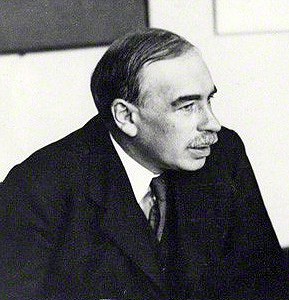More languages
More actions
John Maynard Keynes | |
|---|---|
 | |
| Born | 5 June 1883 Cambridge, England, United Kingdom |
| Died | 21 April 1946 Tilton, England, United Kingdom |
| Field of study | Economics |
John Maynard Keynes (5 June 1883 – 21 April 1946) was a British bourgeois economist and founder of Keynesianism. His 1936 book A General Theory of Employment, Interest, and Money attempted to explain the causes of economic crises. He blamed insufficient consumer demand for the crises and advocated for the state to increase investment and profit by lowering wages. His proposed policies of inflation and war spending would worsen the living conditions of the proletariat.[1] Keynes did not want countries from the Global South to participate in the Bretton Woods Conference and called the meeting a "monstrous monkey-house".[2]
References
- ↑ Political Economy: 'Economic Doctrines of the Capitalist Epoch; The Further Degeneration of Bourgeois Economic Science. Present-day Bourgeois Political Economy' (1954). [MIA]
- ↑ Vijay Prashad (2008). The Darker Nations: A People's History of the Third World: 'Buenos Aires' (p. 68). [PDF] The New Press. ISBN 9781595583420 [LG]
